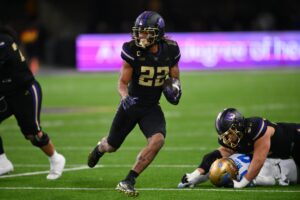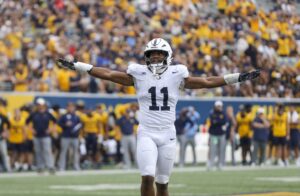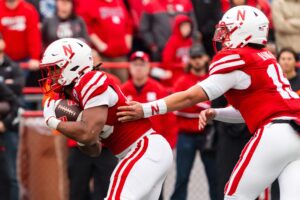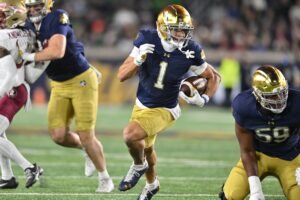It was long overdue. That means it was obvious to everyone except those who had the decision-making powers in their hands. The Pac 12 conference parted ways with commissioner Larry Scott Wednesday night. Scott had been the commissioner since 2009. He will stay through the end of the academic year, June 2021. That is a year shy of the end of his contract. So now the Pac 12 finally moves forward, while still dealing with Larry Scott’s tattered legacy.
Scott saw the rise of historic revenues in the conference. He was also responsible for the status of the conference falling far below those of the other Power Five conferences.
The conference’s presidents and chancellors issued a statement Wednesday night lauding the accomplishments of the conference under Scott’s guidance. He then sent a letter to the conference athletic directors making sure they heard from him that it was a mutual decision. It was a bizarre move to assume they did not already have the details from their bosses, the heads of the universities. And it was mutual in presentation only, not in reality.
Larry Scott’s Tattered Legacy
The conference’s press release included the following statement from Scott; “I was in pro sports for 20 years, I’ve now been in college athletics for more than 10 years, and now is a great time in my life to pursue other exciting opportunities.” That would be the accepted verbiage. Except for two months ago, Scott gave an interview with the Sports Business Journal in which he said he anticipated at least a two-year contract extension. That would have gotten him through the upcoming TV contract negotiations. You don’t assume an extension and then just eight weeks later decide it is time to move on. It was decided for you.
Scott came to the conference leadership position after 6 years running the Women’s Tennis Association. He made great strides for the women’s tour in tv revenue and revenue payouts for the players.
In 2011 he secured the biggest tv contact deal in the history of college football on behalf of the Pac 12. The 12 years for $3 billion was staggering. But as in the case in most sports contracts, a long-term deal incapacitated the conference with changing with the ever-evolving tv and digital media landscape. Within three years, the other four power conferences had better deals.
The Network Was The Thing
While the revenue growth was significant for the conference, the Pac 12 has to deal with the albatross that will forever be around Scott’s neck….the Pac 12 Network. The Big Ten, the ACC, and the SEC have their own conference networks that are in partnership with either Fox Sports or ESPN/ABC. The Pac 12 Network has no partners and that is on Larry Scott. Within two years of the launch of the network, he had an offer from ESPN. They would pick up the production and operating costs in exchange for a revenue-sharing agreement. Scott said no. He would rather remain independent. It is a decision that haunts his legacy to this day. The network got stuck with garbage air times for its games. While “Pac 12 After Dark” was kitschy, it did zero to advance the reputation of the on-field product.
Scott also took the conference headquarters from the sedate and affordable Walnut Creek in Northern California to San Francisco, one of the most expensive cost of living cities in the country. Expenses ballooned while ad revenue failed to keep up.
When the conference football season was on-again/off-again all Summer, the network gutted its on-air and production staff. Then, when the conference decided it would play a modified seven-game schedule starting in November, all of the games were on ESN/ABC or Fox. There was no revenue rescue for its own network because the schools were more desperate for the larger money from the major sports networks.
Scott recently said the mission of the network was to provide a platform for the Olympic sports that rarely get any TV coverage. Stanford, UCLA, and USC combined have more NCAA championships than any other conference in its entirety. But the rationalization from Scott is hollow. The network was created to be a source of revenue for the 12 member schools, which means football and basketball coverage. Those draw the eyes and the advertisers. Instead, the network was never carried by DirecTV. And when AT&T bought DTV, the parent company also dropped the Pac 12 Network from its flagship U-Verse lineup.
Financial Distress
The nadir of the Scott era was two Summers ago. With finances becoming an issue for the conference, and the member schools, he went on an investors roadshow. He went to investment firms across the country. Scott’s ask was $750 million. His offer back to the firms was virtually nothing. Private equity firms and other groups he met with wanted a seat at the decision-making table in exchange for that kind of money. Scott was not in a position to provide it. His conference chancellors and presidents were the decision-makers. All he could offer was some potential future return on investment. According to sources in the Bay Area, he never got an offer of any kind. He walked away with an empty hat in hand.
Now with years’ worth of declining revenue, and schools that are financially decimated because of COVID related issues, the conference needs real help. Scott said last month that the conference could float low-interest loans to the schools. It was the equivalent of the head of a “family” charging a vig on a loan to his own kids. But Scott and the conference do not have the money to float in the first place.
Who Will Call The Shots?
The decision on the next commissioner will begin and end with the ability to negotiate a new TV deal. The current 12-year deal ends in 2024. With no viable partners, Scott for years has been talking about how the conference is in a position to own the cord-cutters. It was like claiming there was no iceberg ahead right before the ship hits it squarely.
The decision-making group is a unique part of the process. Ana Mari Cauce from the University of Washington, Kirk Shultz of Washington State, and Michael Schill of Oregon make up the executive committee that will begin the search process. There is no representation for any of the nine schools south or east of the Oregon border. They also represent some of the old guard of the conference’s presidents and chancellors. The three of them have been in place since 2016 or earlier. They join Gene Block (UCLA since 2007), and Michael Crow (Arizona State since 2002), as those who have been in place at their schools the longest. They have accepted more of what happened under Scott more than the others.
The Candidates
Oliver Luck is going to be the name that jumps to the forefront of everyone’s list. He has years of administrative success. He has been athletic director at West Virginia University, general manager of a team in the World League of American Football, and commissioner of the XFL. Most importantly, he has been a member of the NCAA college football playoff committee, and Executive Vice President for Regulatory Affairs with the NCAA.
He is the most logical choice. Odds are decent that is enough for Cauce, Schill, and Shultz not to choose him.
Alabama athletic director Greg Byrne will get some consideration. He is only 49 years old. He runs a successful athletic department, has ties to the Pac, and has been the athletic director at Arizona since 2010.
Ohio State athletic director Gene Smith is known to be favored by some of the conference’s 12 administrators. He was the athletic director at Arizona State from 2000-2005. But he currently commands one of the largest athletic department budgets in the country. At age 69, it is hard to see the motivation for him to take the job.
With the conference fancying itself as unique and not something outsiders would understand, Ray Anderson may get a look. He is the athletic director at Arizona State and was the conference’s administrative point person during the COVID chaos of last Summer. The committee had one school president (Schill), one coach, (Stanford’s David Shaw), and one administrator, (Anderson). It may be enough to give him an inside edge.
One name that a few sources have told us to keep an eye on is Gloria Nevarez. She has been the commissioner for the West Coast Conference for the last three years. Nevarez was also Pac 12 senior associate commissioner from 2010-2017. She also has experience at a college football powerhouse having been associate athletic director at Oklahoma. The upside is her knowledge of all things Pac 12. The downside is it came under Larry Scott.
Whomever the pick is, it will likely not happen until late Spring to accommodate a transition from their old job and into Larry Scott’s office. The work will begin quickly on establishing value ahead of the television negotiations which will start in earnest by the end of next year. The football tv deal will seal the commissioner’s legacy within their first three years on the job.






